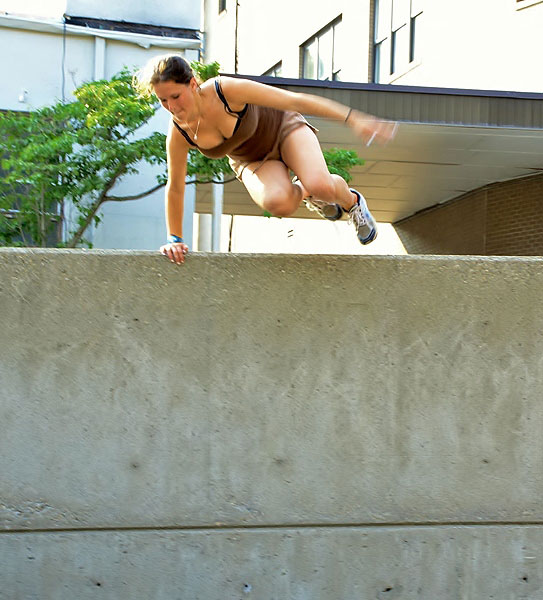
If you’ve ever seen people in the city scaling walls, leaping down staircases or vaulting over obstructions like they’re being chased by the bad guy in some action movie, you’ve been witness to parkour. Juliet Zailskas is the only female parkour practitioner in Rhode Island and she recently spoke with Motif about her love of the sport, the particular challenges she faces as a woman in the sport, and her plans for the future.
Motif: What is parkour?
Juliet Zailskas: It’s getting from point A to point B as safely and efficiently as possible by running, climbing, jumping, or balancing. But more than that, it’s a form of self expression.
M: How did you get involved?
JZ: I met some people on a bus who were talking about it and they convinced me to try it. They helped me train by working on some easy vaults and I practiced the basics for weeks. Rhode Island has a pretty big parkour community and a lot of people come to our events.
M: What goes on at parkour events?
JZ: A group of us gets together and goes from place to place to practice. We play follow the leader, and the city becomes our playground. Our events aren’t competitive at all, although some people think they should be. In parkour, you’re only competing with yourself and working with your limits.
M: Speaking of competing with yourself, you had a recent setback.
JZ: I was in Jamestown, jumped off a high wall and landed wrong. I needed major surgery to correct an injury to my leg. I made that jump because I was angry – I was practicing with people who judged me for being female. They said I was in it just to be with the guys. As a result, I was in recovery for nine months and still have to wear a knee brace to jump around.
M: What are some of the particular challenges you face as the only woman in the sport in Rhode Island?
JZ: Women are built differently than men. Our center of gravity is different and hips and breasts get in the way if you don’t know how to work with your body. When I started, I always trained with guys who didn’t want to help me because I’m female, which was frustrating because being female can be a barrier to my practice that I can’t fix.
M: After your experience, do you feel a responsibility to other women interested in parkour?
JZ: I want to keep the female parkour population growing. You might see a girl jumping around one day or one week and then you never see her again. I just became involved with the World Freerunning Parkour Federation (WFPF) and was talking with them about this issue. It inspired them to create a lady mentor program. As a lady mentor, I can answer questions or give advice to other women starting out in the sport. It’s important that women entering the sport know how to work with their curves instead of mimicking the guys. It’s hard to do a wall run like a guy when your boobs get in the way.
M: Tell me about your involvement with the Gloria Gemma Foundation.
JZ: When I was recovering from surgery, my mom was diagnosed with breast cancer. She’s doing well now, but the diagnosis took a huge toll on her emotionally. During her treatment, I tried for months to have a parkour event for her to show her that people love her even though she isn’t part of the parkour community, and a lot of people sent her videos of them practicing parkour while wearing pink.
Gloria Gemma and the WFPF are helping me create a parkour fundraiser in my mom’s honor. It’s going to take place in the parking lot of the Pawtucket Police Department where we practice a lot. Even the Pawtucket mayor is getting involved because he likes watching us jump around.
M: What does the future hold for you?
JZ: Someday, I’d like to become a certified parkour instructor. But in the meantime, I’m just working with the basics again after recovering from surgery. I’ve been making videos of my progress because it helps me physically and emotionally to look back and see that I’ve improved since the surgery. I never thought I’d come back from it. But I’ve learned that there’s hope after injury and that after a fall to the bottom, you can get back to the top even stronger.